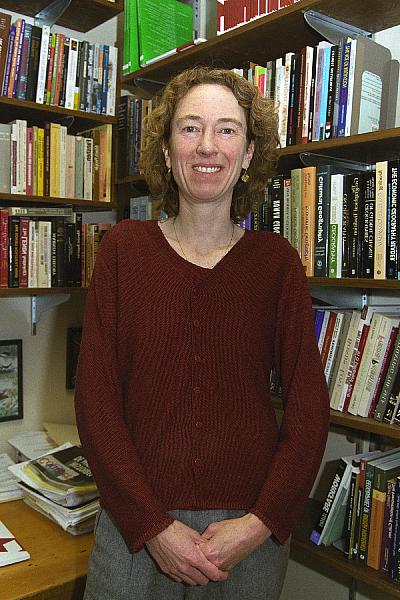November 18, 2004
Mitchell first to hold professorship aimed at connecting with the community
Geography Professor Katharyne Mitchell has been named to a professorship that will give her time to do some concentrated research and writing. But the book she hopes will result won’t be a scholarly tome designed mainly for other academics. It will be a trade book aimed at the general public.
That’s because the professorship is the Simpson Professorship in the Public Humanities, a post designed to foster links between the University and the larger community. Mitchell is the first to hold the professorship, funded by the Walter Chapin Simpson Center for the Humanities.
“Having a professorship like this is something I’ve been wanting to do for a long time because I want to send a strong signal that the public humanities are important,” said Kathleen Woodward, director of the Simpson Center. “I broached the subject to Barclay Simpson, who endowed the Simpson center in honor of his father, and he contributed the support through the Simpson PSB (Put Some Back) Fund.”
Mitchell said that the professorship “represents the legitimizing of our roles beyond the academy. It gives more license and indeed enthusiastic welcome to the possibilities of bringing new people into intellectual debates that are going on.”
The intellectual debate that Mitchell would like to enter has to do with childhood. She calls her project “Stealing Childhood,” arguing that a number of factors are converging to negatively impact the lives of children.
“In school it’s the culture of standardized testing and the resulting focus on a rather narrow curriculum,” Mitchell said. “Outside of school it’s the loss of play space and the privatization of play space. There are fewer public parks than there used to be, and more places where parents pay to have their children play.”
Stealing Childhood is the title of the book Mitchell plans to write as part of her project, but that isn’t the only thing she plans to do. She is currently recruiting four other faculty with whom she hopes to form a “research cluster” as a way to “expand the collaborative process.” The other professors will come from different fields and contribute their expertise to the total project.
One thing Mitchell hopes will be part of that project is a documentary film about K-12 students. She’s therefore planning to recruit one professor with expertise in filmmaking. But she doesn’t want to simply make a film about children; she wants the kids to play an active part.
“I would bring in the students themselves to direct and produce the film with our help. The idea is that they become subjects of the research and not just objects,” Mitchell said. “I want them to realize they can be active agents, even if they’re ‘only’ students. I want them to be reflexive about themselves as the objects of pedagogy and what that means — to have an understanding of how teaching works and how learning works, so they can start to put themselves in the driver’s seat.”
The film, Mitchell explained, would be about the students’ impressions and experiences of being children in this particular era — what it’s like to be tested, like with the WASL, what it’s like to have their play space be defined in certain kinds of ways, what they feel about scheduling in terms of lessons and various activities, what it’s like to have Coke or Pepsi in the schools, and so forth. The students would interview each other and take pictures of things that interest them.
“So it’s an effort to practice what we preach, which is to say democracy isn’t something you wait until you’re grown up to do,” Mitchell said. “Democracy is something you learn by working through differences to try to make a better society. And the starting point of that is reflexivity on your position as the object of education and as a subject that can make a difference.”
This isn’t Mitchell’s first foray into the K-12 setting. She recently received another grant from the Simpson center that gave associate professors release time to have serious conversations with another professor across disciplines. Mitchell’s partner in that project was Walter Parker from the College of Education, and from him she gained important contacts in public schools that will help her with the current project.
Mitchell also hopes that the research cluster professors can write a grant to the National Endowment for the Humanities to get support for a related idea she has about forming “new cultural landmarks” as places for teachers to take students to understand our history — to “get away from the founding fathers as the only cultural landmark we have.”
The professorship, which is for a three-year term, allows Mitchell to teach two classes a year instead of four, provides some resources for community outreach, additional funds on top of her salary, a nine-month research assistant and a small research fund to buy books or go to conferences. For Mitchell, its most precious gift is time
“I’ve done less in the public humanities than I would have liked,” she said. “I’ve always felt somewhat constrained by the necessity to publish in academic journals and to teach. Now I feel I can publish for an educated lay audience. In addition to the book, I’d also like to write magazine articles and to do some speaking.”
Although funding right now is only for Mitchell’s term of three years, Woodward hopes it will continue with other funding sources. In fact, she recently met with representatives of the National Endowment for the Humanities, suggesting that they create a category of fellowship in the public humanities.
“Most of the research support in the humanities has taken the form of the sabbatical,” she said. “This professorship allows the faculty member to stay on campus. I’d like to see the UW professorship be a model for research that connects with the community.”



